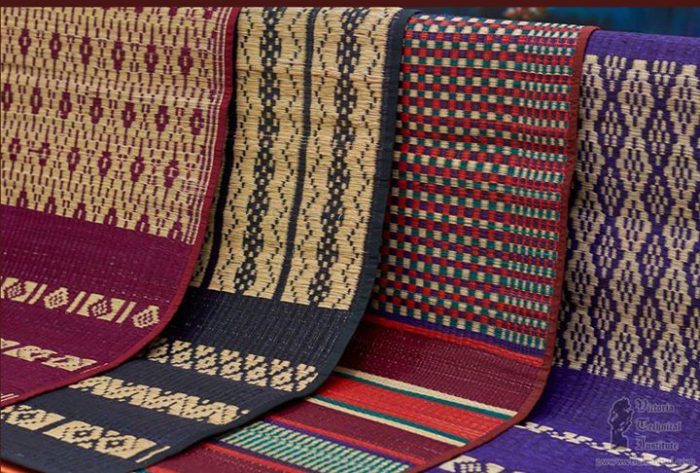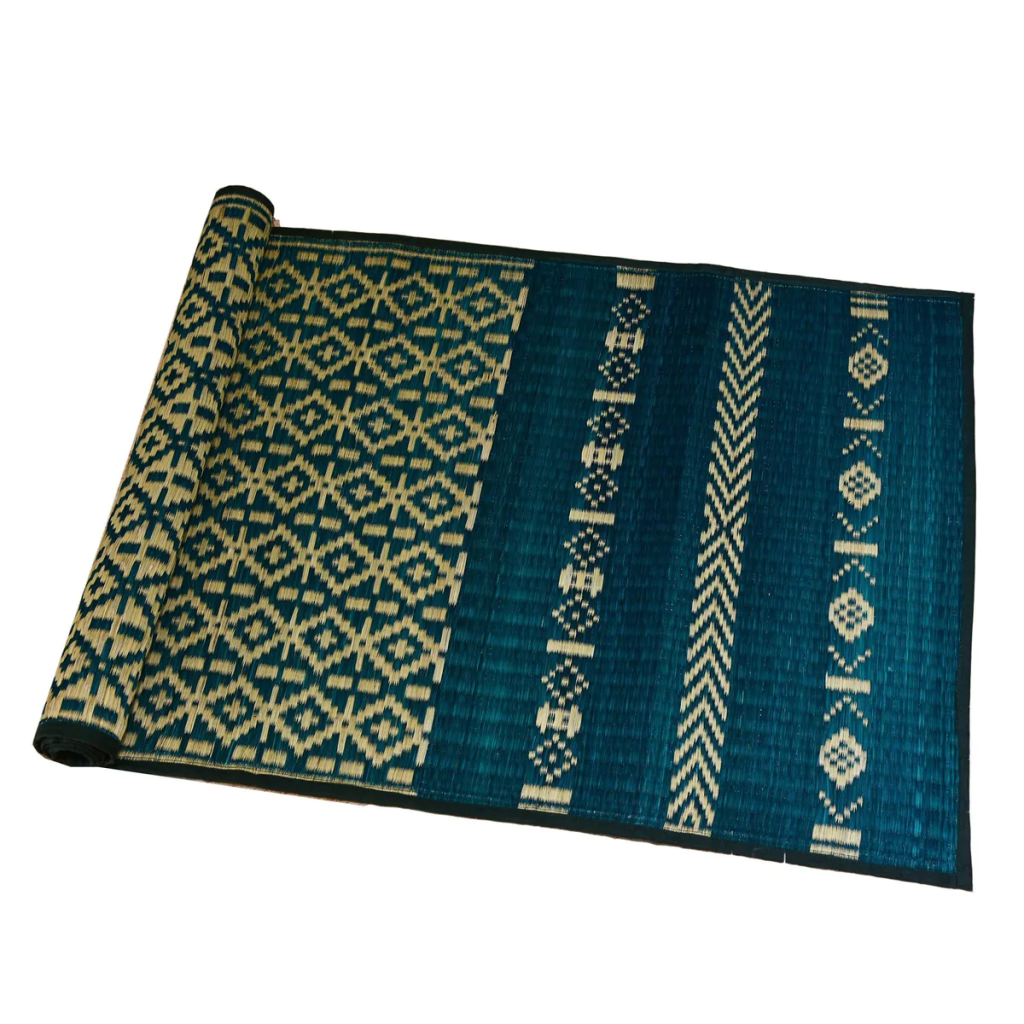ॐ श्री गुरुभ्यो नमः ॐ श्री शिवानन्दाय नमः ॐ श्री चिदानन्दाय नमः
Source of all Images in this Blog-post : Google Images : ‘Google Image Search’ will reveal the multiple sources of every single image shared in this Blog. For more details, kindly see ‘Disclaimer‘
Let us embrace the eco-friendly Patthamadai silk mats and other natural grass products in our daily lives, bidding a permanent farewell to all synthetic materials that have pervaded every corner of the world. These synthetics disrupt and degrade the environment, eroding the pristine purity of our ecosystems.
Moreover, we must collectively acknowledge and appreciate the remarkable ingenuity of our craftsmen, weavers, and tribes scattered throughout India. By doing so, we empower them in an unprecedented manner.
I invite you to join me in this sincere endeavor and noble cause. Let us widely share this blog post across the globe, aiming to safeguard our planet and create employment opportunities for our talented artisans and tribes. Together, we can tap into their timeless skills. JAI HIND!
Buy Korai Pai Handmade Floor Mats from Amazon India by clicking here
Buy Korai Grass Floor Mats with designs from ‘Ash Mats’ on Amazon India by clicking here
Images of these beautiful ultra-soft Silk Mats of Patthamadai, are posted right below. Videos of Pattamadai Mats have also been shared in this post :

Pathamadai or Pattamadai is a town in Tirunelveli district in the Indian state of Tamil Nadu. Pathamadai has a mat industry which produces mats crafted out of Korai grass (Reed plant) also known as Indian Chattai.
These mats are flexible and have been gifted to several global leaders and dignitaries in the past, visiting India.



This Silk Mat or ‘Pattu Paai‘ or ‘Pattamadai Pai‘ (mat) is a beautifully crafted floor mat that will remind us of the lovely afternoon naps at our grand parents’ house in childhood, during school holidays.
The mat is woven using cotton or silk in the weft. The use of silk thread gives a royal sheen and definite appeal to the mat.
Buy Korai Pai Handmade Floor Mats from Amazon India by clicking here
Buy Korai Grass Floor Mats with designs from ‘Ash Mats’ on Amazon India by clicking here

The majority of mats made in Patthamadai have cotton warps and Korai (Marsh reed) wefts. Korai grass is found in abundance along the banks of the rivers and in marshy areas in Tamil Nadu and Kerala.
The most unique aspect of a Pattamadai mat is its ultra-softness and tremendous flexibility. The mats, depending on the weaving, range from soft to super fine.
The finest and most closely woven mats are called ‘Pattu Pai’ or ‘Silk Mats‘ because of their feel like ultra-soft silk. It takes nearly 45 days of soaking and processing, and then about 2 – 3 weeks to make a single mat.
The processing and weaving time can extend to nearly 4 months for a super fine ‘Pattu Pai‘.
In older times, a bride and groom were gifted with a pair of ‘Pattamadai Pais‘ on their wedding date, painstakingly handmade by the weavers, and inscribed with their names and memorable wedding dates.
These mats have a very long life and were meant to take the couple through their entire life and its various stages, including the birth of a child and co-sleeping with an infant.
Pattamadai Pai (Pattamadai Mats) of Tamil Nadu : An article by Lakshmi Subramanian
The quaint village of Pattamadai in Tirunelveli district in Tamil Nadu is famous for its centuries-old handwoven mats made of korai grass. These exquisite mats found its place on the international market when it was gifted to Queen Elizabeth II on her coronation in 1953 and since then has been presented to dignitaries around the world.
The traditional mat weaving technique is practised in the villages in and around Pattamadai. The weavers attribute the superior quality of the mats to the korai grass (Cyperus corymbosus rottb.) that grows in abundance in the alluvial soil on the banks of the Thamirabarani river and one of the most popular types used in the mats is Karungadukorai.

Locals say that many years ago, Syed Khalifa Meeran, a Lebbai by birth settled down in Pattamadai along with his family to preach. His family were highly skilled in mat weaving and sought to supplement their income by making rough quality mats. Soon, his successive generations mastered the craft and monopolised the industry.

However, the credit for fine quality mats is given to Hassan Bawa Lebbai, a descendent of Syed Khalifa Meeran. It is said that one day when he was drying the wild Korai grass, a sudden thunderstorm with strong winds sent him rushing indoors.
When the rain stopped, he came out to find the Korai grass floating in the Thamirabarani river. As he began to collect the wet grass, he found much to his surprise that the grass was soft and smooth.
He separated the fiber from the waste and found that he could split the Korai fiber into a number of fine strands. Earlier, he could obtain only about 30 – 40 but now he could get about 100 – 120 strands.

He started weaving with these fine strands and found the product to be extremely soft. He decided to experiment by first cutting the korai grass and then soaking it in Thamirabarani river water.
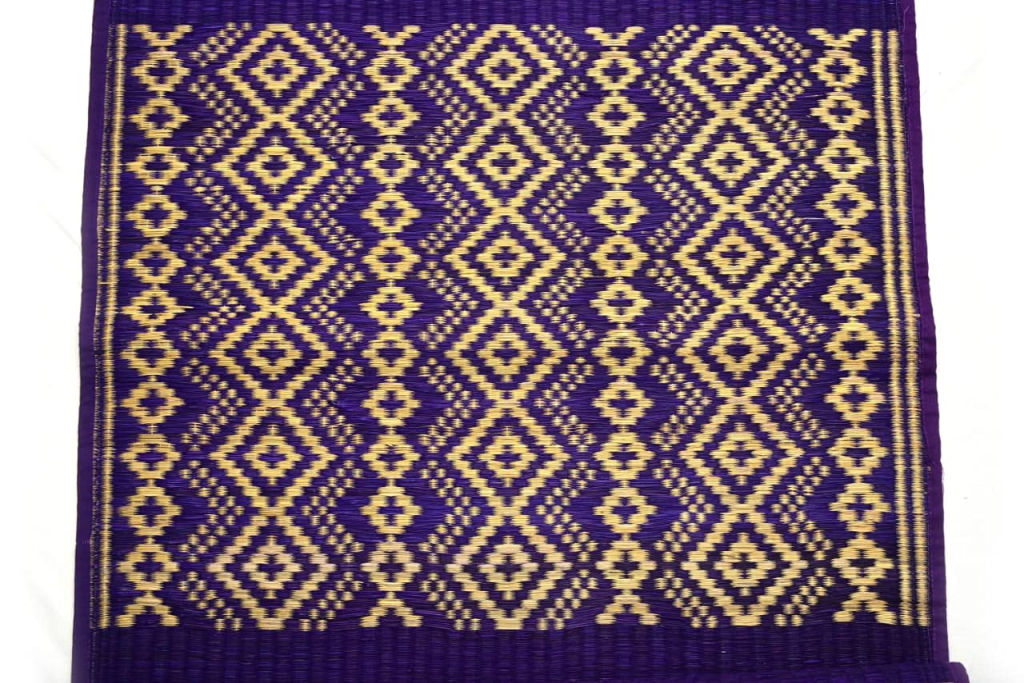
The result was excellent quality mats and soon, fellow artisans also learnt this secret and began the production of fine mats that are unrivalled in quality, softness and smoothness.
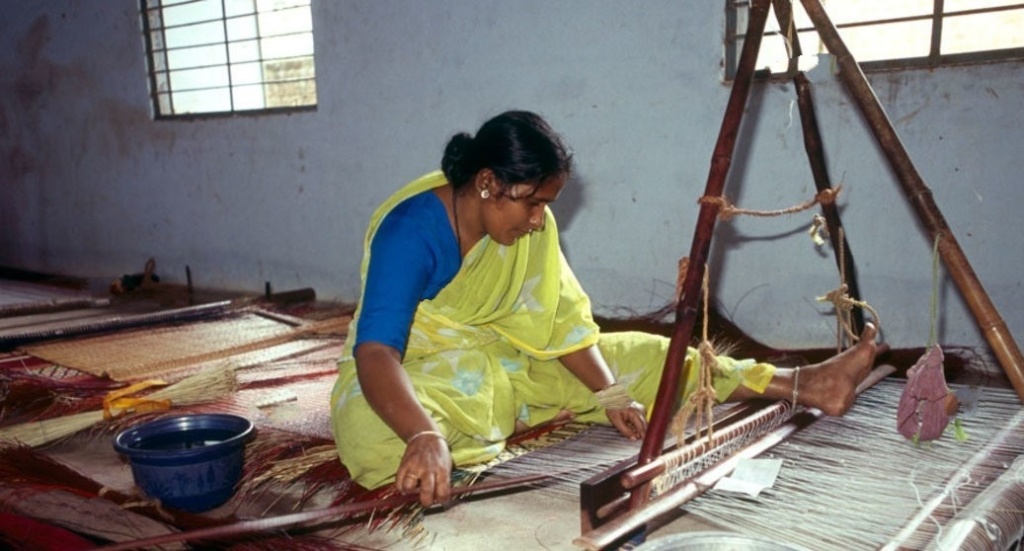
Even today, the korai grass is harvested in the months of September – October and February – March. The outer part of the stem is used for weaving while the inside portion is removed with a sharp-edged knife.
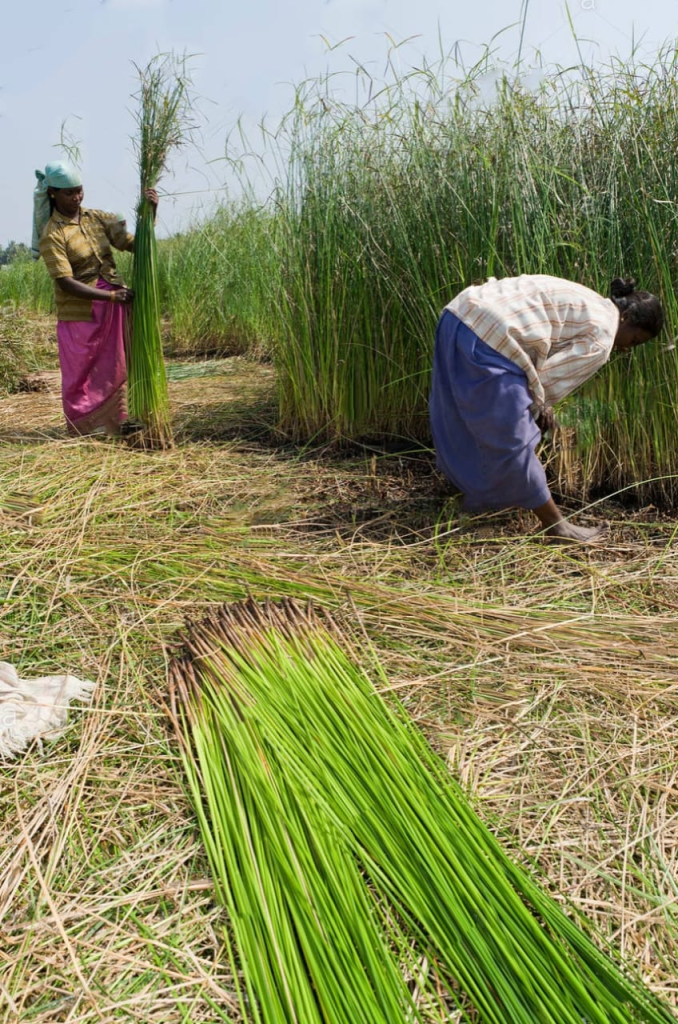
Strips of grass are dried in the sun till they turn yellowish green in colour. They are boiled in a pot of water and dried again and stacked up in bundles and soaked in running water so that the grass will increase its size by up to three times. It is again dried in the sun and then the outer layer is separated and graded.

Both natural and chemical dyes are used depending on the design of the mat. Indian colours of black, brown, indigo, red and green are generally preferred. The types of weaves done are coarse, medium and fine.
The weaving is done on a floor loom which consists of a warp (lengthwise yarns) supported by mukkali (tripod made of bamboo) and the weft (crosswise yarns) is inserted in the needle and passed over and under the warp.
Water is used to soften the grass during the weaving process. The mat is checked for any unevenness after weaving and then dried in the sun for a while. It is then polished with a polishing stone to give it a smooth finish.
These environmentally friendly mats are ideal for hot and humid weather conditions, durable and hardy.
Traditionally, these mats were woven for a bride and a groom with their names inscribed along with the wedding date and presented as part of the wedding trousseau. However, now both power looms and handlooms are used to create these beautiful pattui pai which literally means silk mats because of their softness.
Pattamadai mats or Pais received the Geographical Indication Tag (GI) in 2013.
Buy Korai Pai Handmade Floor Mats from Amazon India by clicking here
Buy Korai Grass Floor Mats with designs from ‘Ash Mats’ on Amazon India by clicking here
Export of silk mats of Pattamadai from India to overseas nations and the demand for these mats in overseas market :
India exports silk mats of Pattamadai to overseas nations. Pattamadai, a small town located in the Tirunelveli district of the southern Indian state of Tamil Nadu, is famous for its silk mats. The Pattamadai silk mats are made from a particular type of grass called Korai grass, which is weaved with silk threads to produce a unique, durable and eco-friendly product. These mats are exported to several countries, including the United States, the United Kingdom, Germany, France, Japan, and Australia, among others. They are in great demand due to their beauty, durability, and quality, and are often used as floor mats, wall hangings, and table runners.
Export Market:
Pattamadai silk mats are primarily exported to the United States, followed by the United Kingdom, Germany, France, Japan, and Australia. In addition to these countries, they are also exported to other countries in Europe, Asia, and Africa.
Demand:
The demand for Pattamadai silk mats in overseas markets has been growing steadily over the years. These mats are in high demand due to their unique design, durability, and eco-friendly nature. They are used as decorative items in homes, offices, and other commercial spaces.
Manufacturing:
Pattamadai silk mats are traditionally handwoven by skilled artisans. The manufacturing process involves collecting Korai grass, which is then dyed and weaved with silk threads to create intricate designs. This traditional method of manufacturing is time-consuming and labor-intensive, but it produces high-quality, unique mats that are highly valued in overseas markets.
Government Support:
The Indian government has recognized the importance of Pattamadai silk mats as an export item and has taken steps to support the industry. The government provides financial assistance to artisans and weavers, as well as technical support and training programs to help them improve their skills and produce high-quality mats.
Future prospects:
The future prospects for Pattamadai silk mats in overseas markets look promising. As more consumers become aware of the benefits of eco-friendly products, the demand for these mats is expected to increase. In addition, efforts by the Indian government to promote these mats in international trade fairs and exhibitions are likely to increase their visibility and demand in overseas markets.
Major use of these mats in India :
In India, Pattamadai silk mats are primarily used as floor coverings, especially during festive occasions and religious ceremonies. They are also used as seating mats and decorative items in homes, offices, and other commercial spaces. Additionally, Pattamadai silk mats are used as wall hangings, table runners, and gift items.
In Tamil Nadu, where Pattamadai silk mats are traditionally made, they are often used in temples and other religious places as a symbol of purity and sanctity. They are also used in cultural events and performances to enhance the visual appeal of the stage or platform.
Overall, Pattamadai silk mats have a significant cultural and traditional value in India and are widely used for their aesthetic appeal and functionality.
Demand for these mats in states outside of Tamilnadu :
There is demand for Pattamadai silk mats in states outside of Tamil Nadu as well. These mats have gained popularity and are now in demand in several states across India. They are available in many home decor and handicraft stores in different parts of the country.
In recent years, there has been a growing awareness and appreciation of traditional Indian handicrafts and eco-friendly products among consumers, which has led to an increase in demand for Pattamadai silk mats outside of Tamil Nadu. Additionally, many people who have visited Tamil Nadu and seen these mats being used in homes, temples, and other places have taken an interest in them and started purchasing them for their own use or as gifts for others.
Therefore, the demand for Pattamadai silk mats is not limited to Tamil Nadu but has spread across India, making it a popular choice for those who appreciate traditional handicrafts and eco-friendly products.
A list of reputed suppliers of these mats for purchasing the mats :
Here are some reputed suppliers of Pattamadai silk mats:
Tamil Nadu Handicrafts Development Corporation Ltd. (TANHDCO):
This is a government-owned organization that promotes and sells handicrafts produced by artisans and weavers in Tamil Nadu. They have a range of Pattamadai silk mats available on their website and in their stores.
Crafthouse India:
This is an online marketplace that offers a range of handmade and eco-friendly products, including Pattamadai silk mats. They work directly with artisans and weavers to ensure fair prices and quality products.
Craftsvilla:
This is another online marketplace that offers a range of handicrafts and traditional products, including Pattamadai silk mats. They have a large collection of mats in different sizes and designs.
Poompuhar:
This is a chain of stores run by the Tamil Nadu Handicrafts Development Corporation Ltd. They have a range of Pattamadai silk mats available in their stores across Tamil Nadu and on their website.
Amazon and Flipkart:
These are popular e-commerce platforms in India that have a range of Pattamadai silk mats available from different sellers. Customers can browse and compare products from different sellers and choose the one that best suits their needs.
These are just a few examples of where you can purchase Pattamadai silk mats. There are many other suppliers available both online and offline, so it’s a good idea to do some research and compare prices and product quality before making a purchase.
The cost of high quality Pattamadai silk mats :
The cost of high-quality Pattamadai silk mats can vary depending on the size, design, and quality of the mat. Generally, larger mats with more intricate designs and better quality materials will be more expensive than smaller, simpler mats.
As an estimate, a high-quality Pattamadai silk mat with a size of around 4 x 6 feet (120 x 180 cm) could cost anywhere from INR 5,000 to INR 20,000 or more, depending on the factors mentioned above.
It’s important to note that the cost of the mat will also depend on the seller and the location where it is purchased. Prices may be higher at retail stores and tourist locations, while purchasing directly from the artisans or cooperatives that produce the mats may result in a lower price.
Overall, Pattamadai silk mats are considered a premium product due to the high-quality materials and the skill and craftsmanship involved in their production, and as such, they may be priced higher than other types of mats.
What is Pattamadai Muhurtha Paai?
Pattamadai Muhurtha Paai is a traditional mat made by weavers in the town of Pattamadai in Tamil Nadu, India. It is a type of silk mat that is used in South Indian weddings and other auspicious occasions as a seating mat for the bride and groom and other important guests.
The term “Muhurtha Paai” refers to a mat that is specifically designed and woven for use during a wedding or other auspicious occasions. These mats are considered to be very special and are usually made with high-quality silk and intricate designs.
Pattamadai Muhurtha Paai is often characterized by its intricate patterns and designs, which are typically woven into the mat using a mix of silk and cotton threads. The mats are also known for their durability and soft texture, which makes them comfortable to sit on for long periods of time.
These mats are an important part of South Indian wedding traditions and are considered to be a symbol of purity, sanctity, and good luck. The weaving of Pattamadai Muhurtha Paai is a specialized craft that has been passed down through generations of weavers in Pattamadai, and it is still considered to be one of the town’s most important handicrafts.




